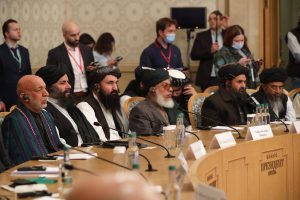Representatives of the United States, Russia, China, and Pakistan began two-hour talks about Afghanistan at 9:00 a.m. Moscow time in the conference hall of Russia’s Kremlin palace on Thursday, March 18. The delegates of the Afghan government and the Taliban joined the representatives at noon, according to a cable by the Afghan ambassador to Russia that was published by Daily Hasht Subh.
The one-day conference is part of a larger effort by regional powers to make peace between the Afghan government and the Taliban. The conference alarmed Afghan women, who are worried about diminishing rights in the country’s future, even though regional powers voiced a strong stance against the return of the Taliban’s emirate and the surge in violence in the country.
Habiba Sarabi, a politician and women’s rights activist, found herself the only woman at the table. In 2005, she became the first female governor in Afghanistan after President Hamid Karzai appointed her to the position in Bamyan Province. Now a member of the Afghan government delegation, she was the only one who could advocate for the oppressed women of Afghanistan at the Moscow conference. There were no women among the Taliban’s delegates.
“Why should [I] be the only woman in the room?” asked Sarabi. “We have not been part of the war, [but] we can certainly contribute to peace. 51 percent of [people] should not be ignored. [I] hope [the] host take note of it for the future.”
In separate invitation letters, Russia invited 16 delegates to represent the Afghan government in the conference. Sarabi, who is also a member of the Afghan government team attempting to reach a peace deal with the Taliban in Doha, Qatar, was the only woman invited to Moscow.
Women’s rights activists in Afghanistan look to international conferences like the meeting in Moscow to protect their basic rights in any potential political settlement between the Afghan government and the Taliban. Afghan women fear that they will lose their legal protections in a potential settlement in the name of peace.
“I feel like I’m slowly vanishing,” said Mugaddesa Yourish, a former government official in Kabul. “My body [and] soul flying away from me piece by piece. Men [in the] Moscow list should abandon [the] conference. [The] region needs to understand that none of their ‘facilitation attempts’ is facilitation without women.”
With all the difficulties that women face in Afghan society, their nightmare is a return of the Taliban’s style of government, an Islamic Emirate. In the absence of women, the chances are higher that men will negotiate over women’s rights in talks with the Taliban. Women fear that they will be victims of the peace talks, while even regional powers oppose the return of emirate system.
The United States joined Russia, China, and Pakistan in a joint statement that stressed that they “do not support the restoration of the Islamic Emirate.”
“Any peace agreement must include protections for the rights of all Afghans, including women, men, children, victims of war, and minorities, and should respond to the strong desire of all Afghans for economic, social and political development including the rule of law,” the statement noted.
The group known as the “Troika,” including the U.S., Russia, and China, plus Pakistan, called “on the Taliban not to pursue a Spring offensive,” a major fighting campaign by the Taliban that happen in the spring season of each year. As the snow melts away in late March, Afghans fear that the Taliban will ramp up their war against the Afghan government and extend their war, once more, against the U.S. forces stationed in the country.
With the slow-motion peace negotiations between the Taliban and the Afghan government, the United States faces the dilemma of withdrawing its remaining troops, estimated at around 3,500. A deal signed by the Trump administration with the Taliban calls for a U.S. troop withdrawal by May 1, but the Biden administration is reviewing the deal and has yet to announce its intentions regarding the deadline. Furthermore, the peace talks have yet to lay out conditions for a troop withdrawal that would not lead to the collapse of Afghanistan.
The joint statement from the Troika, plus Pakistan, after the Moscow conference was largely welcomed by the Afghan government. “We welcomed the strong joint statement on peace settlement in Afghanistan and their support for the acceleration of the peace talks,” said Abdullah Abdullah, who chairs the High Council for National Reconciliation and led the government delegation.
The Taliban, however, lashed out at the joint statement. Mohammad Naim, spokesman for political office of the Taliban, said in a conference that “we would not allow anyone to force upon us a political system. The future political system belongs to the people.” The Taliban also conditioned reducing violence on the formation of an interim government. The Afghan government, and international players, prioritize a reduction in violence.
The Taliban and the Afghan government are engaged in widespread combat that kill scores of government forces and Taliban fighters on a daily basis. Districts across the country are continuously swept between the Taliban and the Afghan government. The Taliban recently claimed that they took control of Charkh district in Logar province, close to Kabul, but the government rejected the claim.
In Moscow, the Afghan government and Taliban delegations did not receive the same diplomatic treatment. Russia did not greet the Afghan government delegates at the airport, did not provide transportation for all of them from the airport to the palace, and did not provide hotel accommodation for them, according to a cable sent from Moscow to Kabul that was published by Daily Hasht Subh.
The Taliban were also unhappy with their treatment. Russia invited six delegates to represent the Taliban, but the Taliban sent 10 delegates anyway, according a report by Daily Hasht Subh. The Taliban brought themselves four additional chairs from outside into the summit meeting.

































